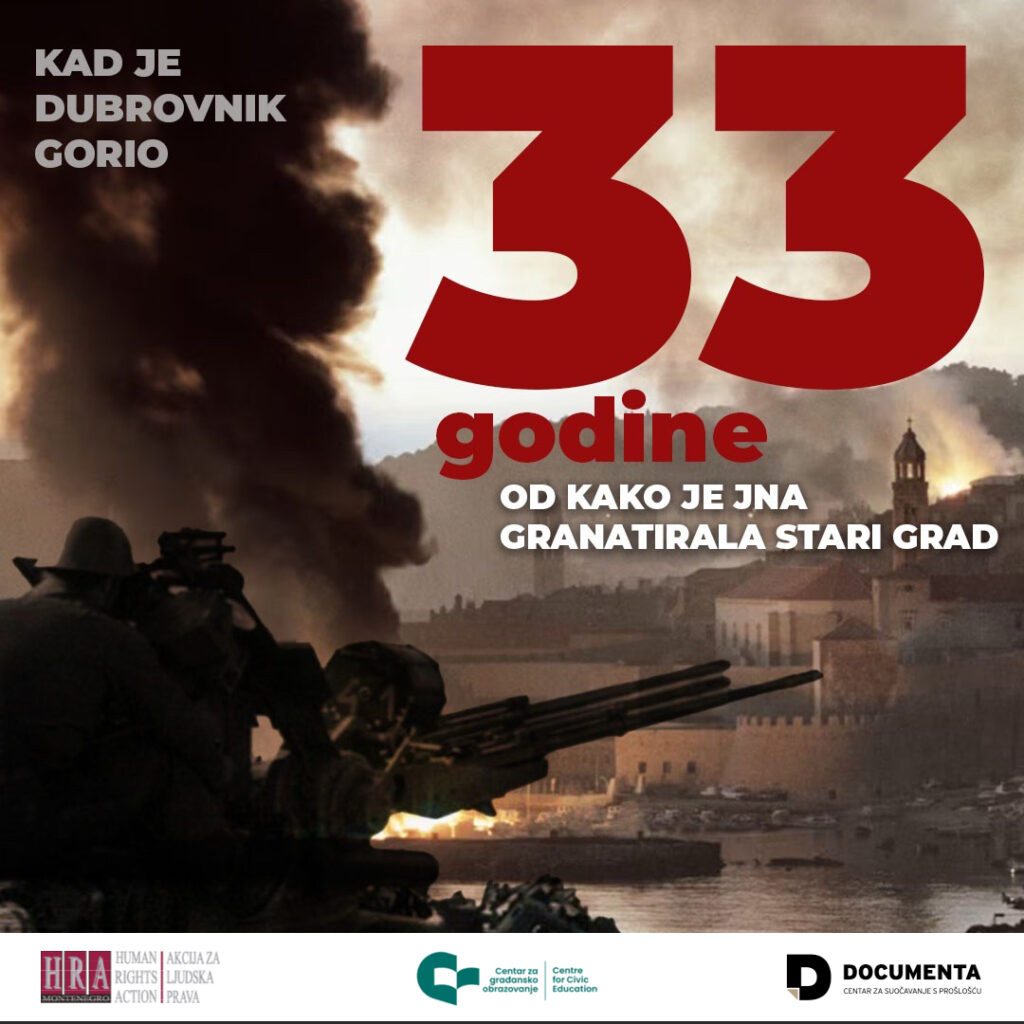Dubrovnik was cut off from the world, isolated in terms of transport and communication. All I had left was faith and hope. These are the moments when a person either collapses or clings to an ideal that Serves as a guiding star, motivation, and strength to endure.
Pavo Urban, 1 August 1968 – 6 December 1991
The Human Rights Action (HRA), the Centre for Civic Education (CCE), and Documenta – Centre for Dealing with the Past remind that on this day, 33 years ago, the Yugoslav People’s Army (JNA) carried out the heaviest shelling of Dubrovnik during its aggression it led from 1 October 1991 to 31 May 1992, against the Republic of Croatia. We expect Montenegro’s judiciary to finally take a serious and proactive approach to prosecuting the crimes committed during the war in Croatia. We also expect cooperation from Croatia and its readiness to contribute to clarifying these cases, treating the issue of war crimes not only as a national but as a regional matter of common interest for the rule of law and reconciliation.
On 6 December 1991, in Dubrovnik, 19 people lost their lives, and 60 were injured. Hundreds of shells were fired at the historic old town, which was protected as a UNESCO World Heritage site. Six buildings were completely destroyed, several others were damaged, including the main street, Stradun. The old town was subjected to artillery attack for over ten and a half hours. Within its walls, Pavo Urban (23) and Tonči Skočko (18) were killed, while three others were severely injured.
The Hague Tribunal convicted JNA General Pavel Strugar to seven and a half years and Admiral Miodrag Jokić to seven years in prison for crimes committed during the shelling of Dubrovnik. Unlike Strugar, Admiral Jokić pleaded guilty and was sentenced under command responsibility. At the time, Jokić apologized for the attack, expressing regret to the people of Dubrovnik for the victims and the damage caused:
…On 6 December 1991, two people were killed, three were wounded, and significant damage was done to civilian buildings and cultural and historical monuments in the old town of Dubrovnik. The fact that these lives were lost within my area of responsibility will remain etched in my memory for the rest of my life. I am ready to bow with military dignity before all the victims of this conflict, regardless of which side they were on. I also, even though I did so during the shelling, both through official channels and personally afterward, feel the duty to once again express my deepest condolences to the families of the deceased and injured, as well as to the citizens of Dubrovnik for the pain and damage caused by the unit under my command. I understand my regret as a condition for reconciliation and peaceful coexistence among the people in this region.
Despite the illegal shelling of Dubrovnik on 6 December, the Hague Prosecutor’s Office did not investigate other crimes committed by JNA members during the six months of occupation of the wider Dubrovnik area. During that period, 116 civilians were killed, 194 Croatian soldiers and 165 JNA members from Montenegro died, 443 people were detained in inhumane conditions in camps in Morinj and Bileća, 33,000 people were displaced, 2,071 residential buildings were destroyed, and private and public property was systematically looted. The city of Dubrovnik was without electricity and water for 138 days, under naval and air blockades.
These figures indicate numerous crimes, yet Montenegro has only prosecuted four individuals who participated in the abuse of prisoners in the Morinj camp, located on Montenegrin territory.
Although revisiting the responsibility for the events in the Morinj camp has been a strategic issue for Montenegro since 2015, it remains a dead letter on paper even after nine years. This inertia has been noted in Montenegro’s EU accession process, which led to the inclusion of high-level war crime prosecution as part of closing benchmarks for Chapter 23, including the prosecution of command responsibility, as, for example, should have been the case in the Morinj camp, but was not yet considered.
Since the Montenegrin prosecution has shown no proactive approach to prosecuting war crimes, the Special Prosecutor’s Office (SDT) committed to contacting regional prosecutors to request the transfer of all cases over which Montenegro could assert jurisdiction.
One such case, initiated in Croatia 15 years ago, charges former JNA military commanders from Serbia and Montenegro – Jevrem Cokić, Mile Ružinovski, Pavle Strugar, Miodrag Jokić, Branko Stanković, Obrad Vičić, Radovan Komar, Vladimir Kovačević, Milan Zec, and Zoran Gvozdenović – for war crimes in the Dubrovnik battlefield. They are accused of failing to prevent the actions of their units that violated the Geneva Conventions, including shelling residential areas, killing civilians (116), imprisoning, abusing, and forcing civilians to flee, destroying civilian, cultural, religious, and economic buildings, and looting and burning property.
According to data from the Split Court, Radovan Komar and Vladimir Kovačević were born in Nikšić, but their residence has remained unknown for 15 years since the indictment. Consequently, in 2022, an arrest warrant and a European Arrest Warrant were issued for them.
Since neither Serbia nor Montenegro are obligated to extradite their citizens to Croatia for war crimes charges, our organizations have previously requested information from the Croatian State Attorney’s Office (DORH) and the County State Attorney’s Office in Split on whether this indictment had been submitted to Montenegro’s Ministry of Justice, urging them to inform their citizens that criminal proceedings are being conducted against them in Croatia. We also inquired whether transferring the case to Montenegro’s judiciary was being considered, as has happened with other cases in the past. Despite follow-ups, we received no response. Montenegro’s prosecution has also remained silent, having failed to provide any information to the public for over six months on whether it has shown any interest in this case.
Human Rights Action (HRA)
Centre for Civic Education (CCE)
Documenta – Center for Dealing with the Past

